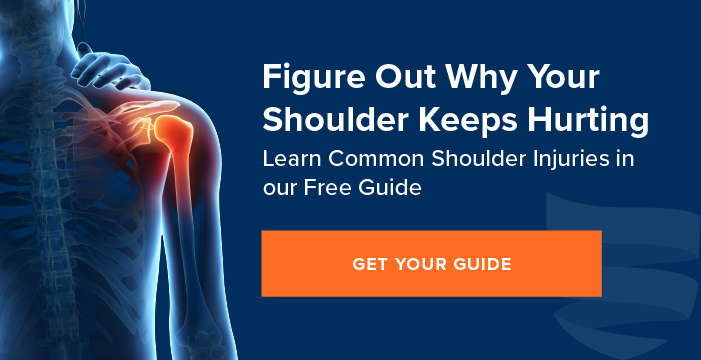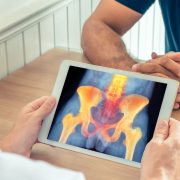
Rotator cuff tears are one of the most common shoulder injuries. They can creep up slowly over time, or come on suddenly as a result of a fall or other accident. Individuals with a rotator cuff tear often experience significant pain and discomfort. It can even prevent people from performing their favorite and mundane, daily activities.
At EmergeOrtho—Triangle Region, it is our goal to help you return to the things you enjoy most. Our subspecialty, fellowship-trained orthopedic Shoulder Physicians specialize in precision diagnosis and personalized treatment. If you have a rotator cuff tear or other type of shoulder injury, we will help you find the solution needed to Emerge Stronger. Healthier. Better.
How to Tell If You Have a Torn Rotator Cuff: Five Clues
Rotator Cuff tears affect an estimated two million Americans every year. According to research, the prevalence of a rotator cuff tear is 25 % in adults ages 50 years and older.
The rotator cuff is what keeps your shoulder socket in place. Four muscles join as tendons to envelop the head of the humerus bone. The rotator cuff connects the humerus to the shoulder and is responsible for the rotation and lifting of your arm. Given the way the rotator cuff functions to help you perform everyday tasks—from playing tennis to brushing your hair—it is easy to see how a rotator cuff injury can be a frustrating prognosis.
But how do you know if you have a torn rotator cuff?
There are certain symptoms that indicate the presence of a rotator cuff tear. Take a look at five telltale signs:
- Pain that worsens with specific movements of the shoulder—lifting and lowering.
- Night time pain when you are trying to sleep.
- Weakness in the shoulder and arm when trying to lift an object or when rotating the arm.
- Crackling or “sticking” sensation when you move your shoulder.
- Mobility limitations and reduced flexibility of the shoulder and arm.
How Does a Rotator Cuff Tear Occur?

There are several ways a rotator cuff can be subjected to a tear. As previously mentioned, the percentage of rotator cuff tears rises with individuals age 50 and over. This happens as a result of wear and tear to the rotator cuff muscles and tendons over time. “Degenerative tears,” as they are medically termed, are typically more common in the dominant shoulder/arm and simply occur as part of the aging process.
“Acute tears” differ in that they are caused by falls, a sudden jerking motion, or overextension of the shoulder muscles from heavy lifting. They can also be an associated injury that occurs with a dislocated shoulder or broken collar bone.
Any sport or occupation that relies on repetitive motion of the rotator cuff can produce a tear, including:
- Tennis
- Baseball Pitching
- Painting
- Carpenter-related professions
Rotator Cuff Pain Treatment Options
Most rotator cuff injuries heal from the use of conservative treatment methods. If your orthopedic doctor confirms the presence of a rotator cuff tear, one or more of the following treatment options may be prescribed:
- Rest and Activity Modification
Sometimes simply limiting certain activities that exacerbate shoulder pain encourage the rotator cuff to heal. Your orthopedic doctor may suggest resting your shoulder from specific sports or activities until your injury has healed properly. - Medication
Nonsteroidal anti-inflammatory medications can reduce pain, inflammation, and swelling to provide temporary relief of rotator cuff discomfort. - Steroid Injections
Cortisone has been shown to improve pain and inflammation associated with rotator cuff tears, but may not be appropriate for all patients. - Physical Therapy
Specific exercises and stretches are designed to strengthen the shoulder muscles and restore mobility. Your orthopedic physician may suggest performing certain rehabilitative routines with a physical therapist.
Sometimes a rotator cuff tear is simply too severe to recover properly without surgical intervention. Full thickness tears and partial thickness tears that do not heal with conservative treatment typically require surgical treatment.
In the event rotator cuff surgery is needed, EmergeOrtho—Triangle Region Shoulder Surgeons are renowned for their use of minimally-invasive surgical approaches. Our surgeons utilize an arthroscopic technique that allows for ultimate precision and minimal incisions to repair the damaged shoulder.
If your shoulder pain is preventing you from participating in an active lifestyle, do not wait for help; self-schedule an appointment now, to determine if you have a rotator cuff tear. Call us any time at 919-220-5255.








